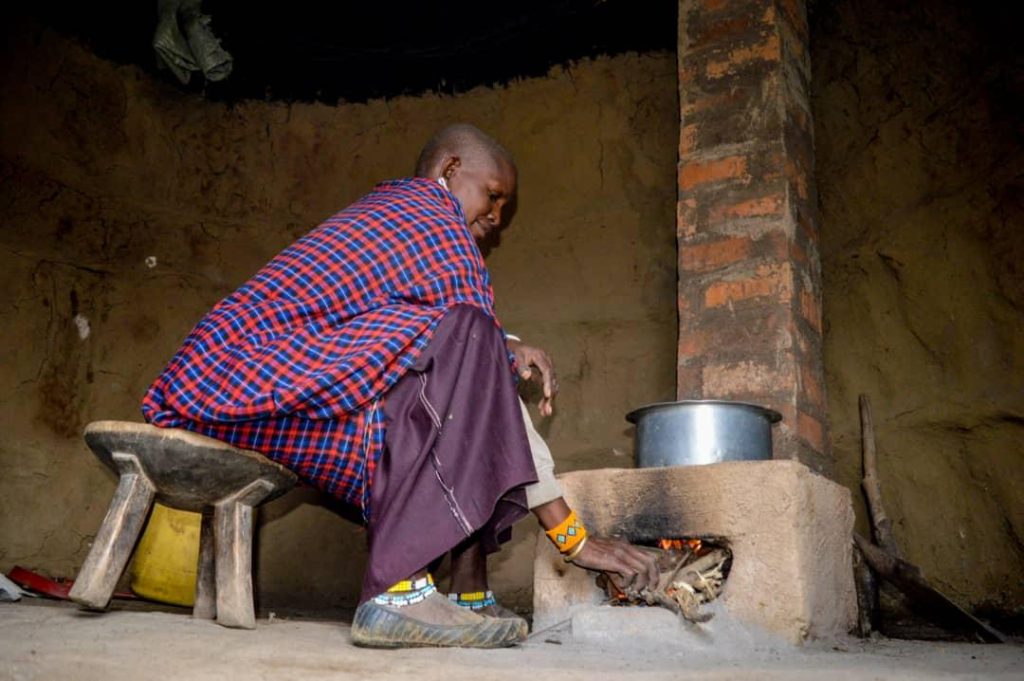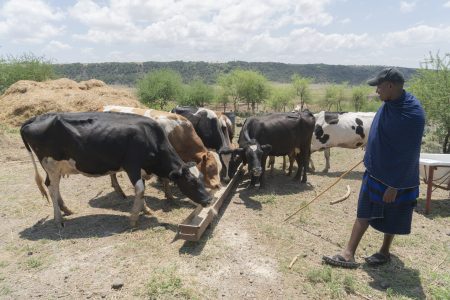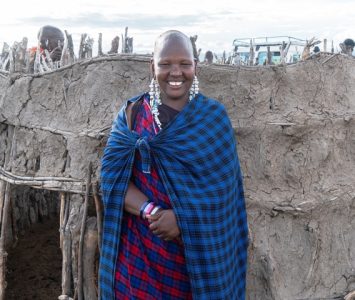Maasai Stoves & Solar Project overview
The Maasai Stoves & Solar Project has a powerful impact on health, economic well-being, women’s empowerment, climate change adaptation in the rain-based economy, and on the quality of life for the people.
The greatest impact
The Maasai Stoves & Solar Project strives for the greatest possible direct impact from its multiple projects.
From the onset, with the introduction of smoke-removing efficient stoves, this has meant better health for women and their children. Because the focus goes beyond a single technological solution, the impact soon spreads and grows. The International Collaborative engages the people as they embrace the idea that problems can be solved through organizing for collective action.
Something new emerges in the midst of idea generation, engineering, design, and resource planning. Participants soon discover the greatest impact is on themselves, as a community. There is a new optimistic celebration of power and the realization of the possibility of genuine life improvement.
Once people experience the joy of working together to make life better, they will want to continue to experience that joy
Scope of Action
Now in the second decade of the Project, the International Collaborative encompasses these main areas of work:
Home improvement and transformed lives of women
- Improved stoves
- Solar electricity for the home
- Water from polluted ponds made safe with chlorination
Women’s direct organizing for financial and social strength
- Organizing women’s groups in villages, building cooperative banks and individual and collective businesses
Climate change adaptation in livestock management and agriculture
- Less dependence on rain is essential to surviving the changing climate
- New approaches to livestock management are essential
- Enterprises and facilities for flexible livestock management; feedlot, cow fodder factory
- Established an agricultural demonstration teaching farm
- Groundwater pumping with solar power for rain-independent irrigation
Impact summaries
Home improvement and impact on women’s lives
The Maasai Stoves & Solar Project addresses the indoor smoke in the homes of pastoral people in East Africa caused by cooking on open wood-burning fires. This is a profound international health issue that affects millions in the developing world.
The Project designs and installs clean-burning and efficient wood-burning chimney stoves and solar panel-based electrical systems in the homes of the people. In addition, we install settlement-wide solar panel-based micro-grid electrical systems. We purchase and import components of the photo-voltaic systems but produce stoves locally.
Stoves & Solar
The International Collaborative’s durable and efficient Model Four stove reduces carbon dioxide emissions by more than 20 tons, over the course of its lifetime.
Having a light at night is a dramatic lift from poverty. In the small homes of the Maasai even a few watts make a huge difference in the quality of life. In the Maasai areas near the equator, dark nights are long year-round. In addition, cell phone charging in the home is cost-efficient, and keeps the phone safe and away from tampering
Impact summary—7000 stoves installed through 2024
- Each stove saves the woman of the house 10-12 hours of weekly wood-gathering labor
- Each stove saves 120 pounds of firewood per week, reducing deforestation
- Reduction of the polluting particulate level from cooking smoke by 90 percent, alleviating chronic coughing and head congestion, primarily in women and children
- One stove reduces carbon dioxide emissions by 3.6 metric tons per year
- Reduction of carbon monoxide levels in the home by 90 percent, eliminating low-level poisoning
- Eliminates the danger of burns to toddlers caused by open cooking fires in their homes
- Reducing the risk of smoke-related lung disease in children
- Pollution-free and odor-free lighting motivates kids to read and study and makes women’s evening and night work much more pleasant
- Maasai women who join stove installation teams are profoundly appreciative of the opportunity to learn to use tools and master construction and design challenges, and report feeling authentically empowered
- Greater appreciation of the power of the collective, versus what an individual woman can do alone
Maasai Stoves & Solar installation trainers and teams
The stove has a chimney and needs installation and is therefore an opportunity for employment. This is a special feature at the core of the impact of the Project.
Team leaders train women in new villages to become installation experts. Trainers and trainees earn money for this. Installing women have organized themselves as the Monduli Pastoralist Women’s Organization (MPWO) and now have a cornflour mill in Selela village for additional income and community service.
Maasai Stoves & Solar micro-grid electrification impact
From the beginning, the Maasai Stoves & Solar Project has integrated electrification on a home-by-home basis. The International Collaborative continues this approach on a significant scale.
Since 2014 we have also brought shared electrification through micro-grids. The micro-grids supply power to all the homes and corrals of Maasai family settlements, or bomas.
- For the first time, settlements have light at night
- Sixty bomas now have micro-grid electrical service
- The homes have clean stoves, lights and phone chargers
- Maasai men and women are trained in solar installation and electrical maintenance
Safe water chlorination systems impact

Clean, safe water comes to the people
Forty liters of safe water a day provides a woman with drinking and bathing water for her family, without having to treat it herself. Women have a variety of ways to handle badly polluted water, from doing nothing to boiling it, at the cost of more energy and hours of extra work.
Safe water is a crucial lifesaver. Every year in these communities, 35 children per thousand die of water-borne disease before the age of five, with many more sickened.
The installation of a 5,000 or 10,000-liter per day pond-side chlorination system costs only $35 per family. Maintenance with the necessary chemical treatment costs a few cents per month per family.
- Each system is successfully managed by community members responsible for the surface pond use
- System size is set to provide 40 liters per day for each family using that water source
- Costs are low and health impacts very significant and positive
Livestock management impact
The Maasai’s traditional herding practices have made them East Africa’s most famous pastoralists. But because of periods of serious drought in recent years, and the unpredictable weather in the changing climate, new approaches are essential.
Established in 2017, the Project’s Manyara Feedlot is already having an impact, recognized by the Uhuru Torch award that year.
Climate change is already here for rain-based livestock-based economies including ones affecting pastoralists in the plains of northern Tanzania. There will continue to be some seasons with plenty of rain and grass when traditional livestock practices will still function for the people. But it is important to expand flexible solutions for economic and social survival and to keep pastoralists from resorting to moving to urban slums.
The International Collaborative feedlot provides a model of the flexibility required. It demonstrates how to care for cattle with purchased hay and food supplements when weather conditions require it.
Impact of women organizing for social strength and independent income
Women need social connection and independent income, especially in a polygamous
and patriarchal society, such as the Maasai’s.
The International Collaborative organizes two types of women’s groups. These are widow’s groups and groups the women choose themselves, based on family and social relationships but not marital status.
Women getting organized

Groups operate cooperative banks and manage collective businesses
In collaboration with the Global Fund for Widows, the ICSEE (T) organized 25 groups in seven villages. Each group of 25 women receives excellent training. The groups operate their own cooperative banks and manage collective livestock businesses.
The ICSEE (T) Project Organizer succeeds in linking the women to the village authorities for additional support benefits.
Self-forming women’s groups
Women form groups according to their own social criteria and gather the initial capital for livestock fattening businesses. They come to the ICSEE (T) for additional capital and training. To date, the ICSEE has enabled more than twenty of these groups.










 International Collaborative for Science, Education, and the Environment
International Collaborative for Science, Education, and the Environment